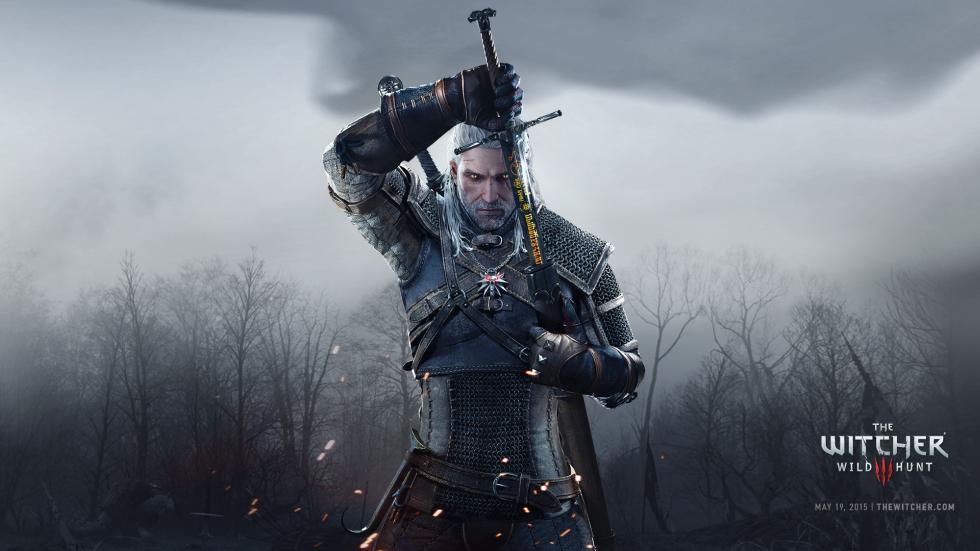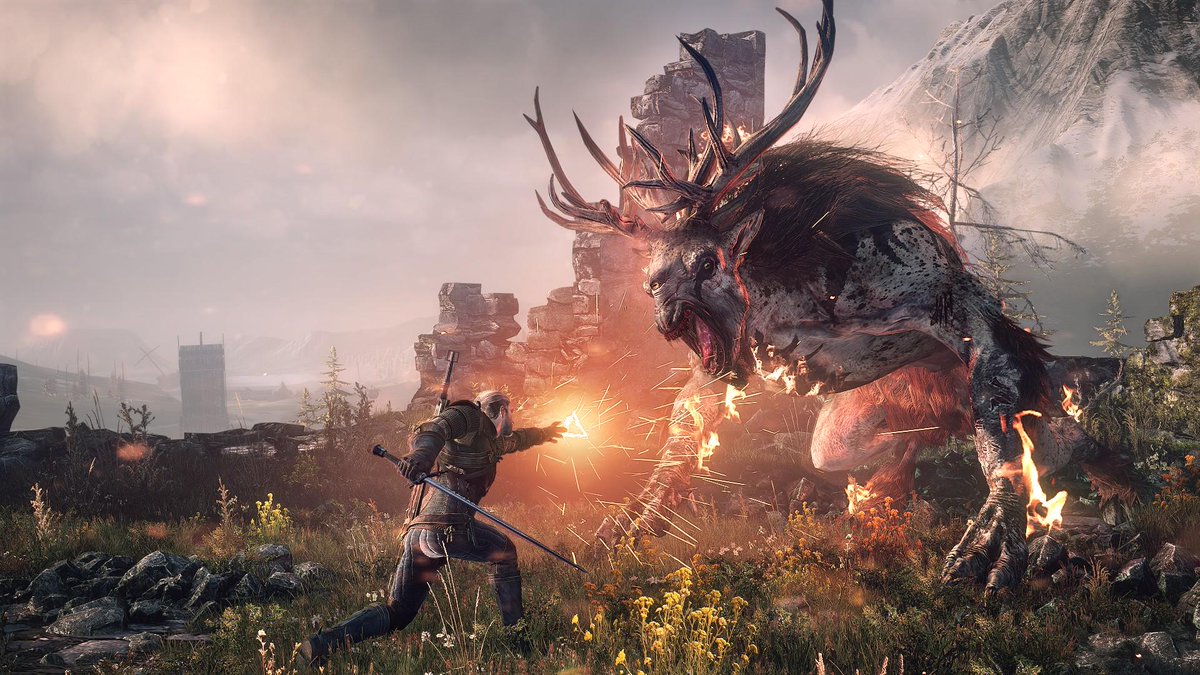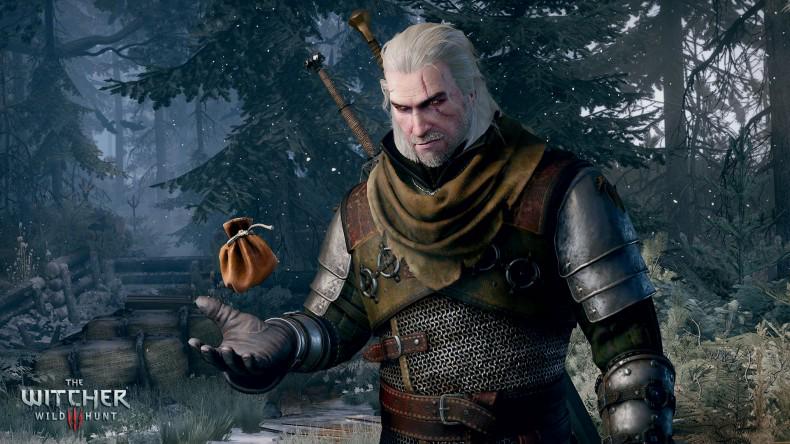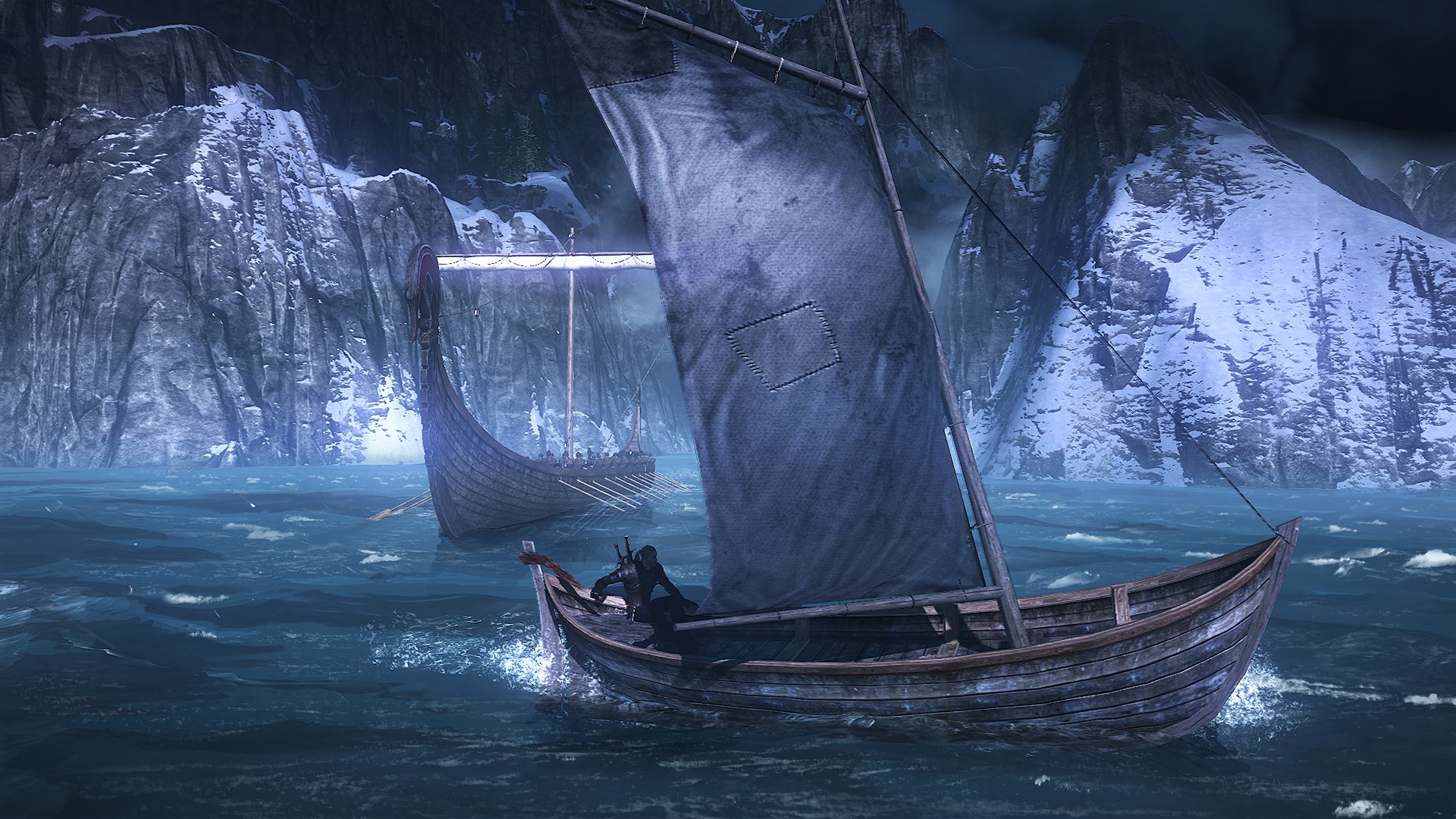The Witcher 3 Interview - PAX East 2015
We chat with Damien Monnier, Senior Gameplay Designer of the upcoming open world RPG
This past weekend at PAX East, New Game Network got the opportunity to sit down with a member of The Witcher 3: Wild Hunt's extensive development team. Damien Monnier (@Bacon_is_life) was kind enough to take the time and let us pick his brain about how CD Projekt RED has (or has not) evolved over the years, the challenges of creating one of the biggest video game worlds ever, the importance of squirrels and ice skating, and the surreal experience of working on one of the most anticipated games of 2015.

New Game Network: Thanks for taking the time to speak with us.
Damien Monnier: It's a pleasure.
NGN: What's your role with The Witcher 3: Wild Hunt?
Monnier: Senior Gameplay Designer.
NGN: How long have you been with CD Projekt RED?
Monnier: Three years.
NGN: You've worked exclusively on The Witcher 3, correct?
Monnier: I arrived shortly after The Witcher: Enhanced Edition. Actually, that was one of the reasons I joined the company. I was very impressed with the way The Enhanced Edition was free for the people who had already purchased The Witcher 2 on the PC.
NGN: It feels like there is a very consumer-friendly culture at CD Projekt RED. Do you feel like there's a particular reason for that?
Monnier: I mean, I know that we're all gamers. I know that for me it was a combination of working for companies before that really screwed gamers a bit. I didn't join the industry to do that. I could see myself being jaded by that. So I found CD Projekt and I thought, "Alright, let's give it a shot." And it's worked. I think there's a lot of people in my position, quite a few boys and girls who have been in the industry for quite a while now who can't see themselves working for anyone else.
NGN: As you wrap up Geralt's story and close the book on The Witcher, how do you feel?
Monnier: It's definitely an accomplishment. I work with some guys who have been in the company since the first one. They're really sad about it, but they're also quite happy. I know a few people are pleased to not be doing swords and armors anymore. They want to change a bit, they're a bit envious of our Cyberpunk team. They want to be doing guns and stuff.
We got to keep some guys for the DLC of course because we have the free DLC which is coming out. It's coming out the day after release actually, so we need to get cracking on it soon. So we still have a lot of stuff to do for the game because we still want to support it. We don't just want to be like, "that's it" and move on. We still have a few people who have quite a few swords left to make.

NGN: I think you joined CD Projekt RED at an interesting time. At that moment, when Enhanced Edition came out, they were a studio on the rise. Now, as we prepare for The Witcher 3, everyone knows who you are. Do you think it's better to be a studio on the rise or do you like having the pressure of expectations?
Monnier: Well, it's been a bit strange because we were clearly the underdog for a while. And I remember - even at E3 last year - when people were coming to the booth and I really had to break it down for people and say "Okay, so he's called "Geralt' and he's a Witcher." And people were like, "A what? A who?" Now you come [to PAX] and people are like, "Hey, it's The Witcher." And you go, "Oh sh*t, everybody knows us now." It's a bit weird.
I was actually at the NVIDIA conference thing at GDC. I was backstage with some people - and I'm not very good with names. So I had these guys who were saying, "I can't wait for The Witcher, it's going to be awesome." And I'm like, "Who is that guy?" It was Kojima's producer and other top guys. It was pretty weird. I should be the one saying, "Your game is awesome."
NGN: What do you sense is the biggest change in CD Projekt RED since you joined the team?
Monnier: The team's expanded a lot. The team is massive and it's been interesting to see how we've managed to keep the essence of CD Projekt RED despite having two hundred people now. It's attention to detail, it's making sure that everything in the world makes sense and is done to certain standard. Ultimately, that's probably one of the reasons we [delayed the release] so late; because all of the departments were asked if [they] could use another 4, 5, or 6 more months. Would they be happy? What would they do with it? And everybody was like, "Yeah, we'd bring back this feature, we'd polish this cutscene."
I think that what's changed is the size. But ultimately we haven't changed as a company. It still feels a bit like an indie company, which is a bit weird.
NGN: What's been the greatest challenge with The Witcher 3?
Monnier: That's a loaded question because everyone in the studio will tell you something different. I mean, you speak to the rendering guys, they'll tell you it's the amount of stuff we show and the draw distance.
From our point of view - the gameplay and living world team - it's trying to fill this world with monsters, animals, and population. And that's a massive challenge because the world really is massive and we're populating it so it doesn't look too busy or too empty. If it were a linear game it's a bit easier to go, "Well, unless the player has stopped touching the pad, they'll be here in seven minutes so we can have this happen." Whereas [in The Witcher 3] you can go anywhere. So it's harder for us to give a scripted experience. We have to trust our systems to make things happen when [the time is right].

NGN: Is there a particular set of challenges when adapting a novel into a video game?
Monnier: For The Witcher in particular, yes, because it's extremely popular in Poland. Everybody's read it. And it's not just people of my generation, but older generations as well. It's also super popular in Russia. We still have people coming to us and saying, "I didn't picture this character to look like this." Even if there's a clear description that says, "He is a long-haired whatever." And I don't mean Geralt, because by now people have accepted what he looks like.
There are locations that people pictured to be different. You don't want to upset them, but at the same time everyone is going to picture things differently. Even within the studio it's the same. People will be like, "Well, he would be a bit more like this." Or, "This is something Dandelion would say, but not this guy."
NGN: Speaking of characters, Yennifer and Ciri are in The Witcher 3: Wild Hunt. Can you talk a bit about the choice to bring them in?
Monnier: The writing team, when they first started working on the third installment, knew they wanted the game to be about Geralt trying to find Ciri and The Wild Hunt. Then they [deliberated] and said, "Okay, it's the last game so she has to come in." And then later people said, "Okay, what if Ciri was a playable character. How would that work?" So we see the struggle from her point of view.
NGN: What was the difficulty of bringing those two particular characters, two of the most prominent women in the books to life?
Monnier: Like I said, some people didn't picture them to look like the way we've designed them. We're talking hundreds of concepts, there's hundreds of different Ciris and Yennefers back in the office that didn't make the cut. And maybe within those you'll find the one who looks like what you had in mind.
And finding the voice [is tough] as well. It's not just about look and, like I said, it's from the book so people picture some voices to be a lot different. We worked with an external company and they'll send us clips of actors they think suit the character. So we listen to them and go, "It's a bit too cheeky, she's not that cheeky. That's a bit too clever."
It's the same for all the languages. A lot of work goes into it. Because I'm French I was asked to listen to the French voices and I worked with the other two French guys. So we listened and gave our feedback. I realized some stuff that I thought was a perfect fit, they disagreed. And vice versa. It's sort of subjective.
NGN: Open world games tend to suffer from a narrative perspective. For instance open worlds like Skyrim or Fallout versus something like Mass Effect or The Witcher 2, which are more focused experiences. How do you marry the two design concepts to keep that narrative spirit alive?
Monnier: It is not easy, but you basically have your main quest and you have to make sure you don't do something where a side quest would drastically change something about you or the environment. At the same time you don't want things to be detached.
I loved Skyrim, don't get me wrong, I spent a lot of hours in it. But it's true that when you have been ignoring the main quest, like I had, and you've killed 25 dragons, when someone says, "Oh, there's a dragon!" You've already killed 25 of them. Or they say, "Are you familiar with magic?" And I go, "I'm the head of the magician guild." It is so disconnected. Ultimately, I was just way overpowered for the main quest, so that also felt quite disconnected. We've really learned from that.

NGN: Speaking of being overpowered, The Witcher is known for being a very difficult - sometimes punishing - experience. As you were creating this bigger and more expansive game, has there been the temptation to lower the difficulty?
Monnier: We didn't want it to be too easy, but we wanted to work on things that upset gamers from the second one. Mainly combat. We wanted a system that was a bit more responsive. Now, if you die, it's definitely your fault. It's not because you didn't roll fast enough.
As far as the rest [of the game] is concerned, if you want to just enjoy the story, you can play on easy. Actually, we're going to change the names because we think it's not fair to say it's on "easy". We might call it "Story mode" or something.
We've done that because we think it would be a shame for people to be put off. We've worked really hard to make sure it's a really kick ass story. The story is great. You could make a TV show out of it and it would be brilliant. So if you want, you can put it on the hardest settings, but everything is balanced. It's whatever you want.
NGN: Since the announcement of The Witcher 3, you made a lot of statements, a lot of promises. At any point did you feel like you might be in over your head?
Monnier: Yeah. There are a few things that got cut because of time. I can't think of something [specific] off the top of my head.
We cut things because they didn't work. Like the ice skating. We had ice skating when you played as Ciri toward the end. It looked really cool, even just a prototype, I really liked it. But some thought it was a bit silly, even if it was in the books. Some people thought introducing a gameplay mechanic so late in the game was a big no-no. So it was cut.
Sometimes you just want to do too much, but it's good that you try. No one sees [that] as a waste of time, even though it took a lot of manpower to come up with it. It's great we're allowed to do that.
NGN: What's been your favorite memory of working on The Witcher 3?
Monnier: I had received a bug I was supposed to fix, it should have taken me 10 minutes and it took me about two and a half hours because I got super side tracked. I'm testing and I see this guy standing in the field, and I had never seen him before. So I went to speak to him and he sent me on a side quest. I thought, "Oh, this will be quick because it's a mini-side quest." Then there was a twist. I thought that was interesting, so I carried on. Then it was two and a half hours later. Lunch time and I had only fixed one bug the entire morning - super inefficient.
To me it was brilliant. Basically when you make games you're so - not bored of them - but because you have seen them from the beginning, when they are very ugly, you struggle to see where they are now. You always see them as not good enough, and you never play them - I've never played any of my games and I've been in this business for like 10 years now. So to me that was great because I've never done that before. If I'm capable of getting lost in this world, which I know inside-out, then we have something quite special.

NGN: The Witcher is not a particularly unique fantasy world with its elves and dwarves, but something about it seems to capture players' imaginations and make it greater than the sum of its parts. Why do you think that is?
Monnier: I think it's the maturity. There are elves and dwarves, but I think they are there to show differences and reflect on issues that everybody is familiar with - like racism. Problems that we struggle with, and I think people can relate to it because it's not just elves jumping around and shooting arrows, it's elves complaining because the dwarves are being racists and dwarves think elves are being racists. And it's not just about racism, there's a lot of stuff like that - sexism as well.
Especially after things like Game of Thrones came out, there is a demographic out there which is ready to enjoy a more clever or smarter medium; whether it's a TV show or a game. That's why I think [audiences] dig it, because it's still the fantasy genre, there's still kick ass swords and you get to kill sh*t, but at the same time they want to be taken seriously. They want a quest that makes them think, not just fetch ten dead squirrels.
That's what I dig about [The Witcher 3]. The example I gave you about the quest, I like that the quest really grabbed me and I genuinely wanted to know what it was. I wanted to know the story behind it. I felt for this guy. I don't want to spoil the story, but it was a very human thing. It was really cool and really well written. I think our story team and our quest team are solid.
NGN: Back to talking about the novelization and popularity of the book. The last two books (A Time of Contempt and Baptism of Fire) weren't even available when The Witcher 2 came out here in America. Do feel a sense of pride that you've put those books on the radar for American audiences?
Monnier: Absolutely. It's a bit weird to be totally honest with you. Some of my colleagues grew up with those books. For them it means a lot more because it's something from their childhood. You get a sense of pride when you have Barack Obama talking about the game. You're representing Poland. Most people don't know where Poland is. They can't point it out on a map.
Like I said, we've seen a big difference from a couple E3's ago when literally no one knew about The Witcher. Since then, there's been a couple sales on Steam or GOG and people purchased the first two to give it a shot.
I was doing this talk and I said, "Hands up if you played the first Witcher." I was expecting maybe one or two guys. Honestly, eighty percent of the room - it's a huge room - puts their hands up. I went, "Oh. Oh, sh*t. So you guys know exactly what I'm talking about." It's totally surreal to be honest with you. But our job is to never get big headed. I would like to stay the underdog - it's a comfortable position. You don't want to be the superpower that churns out mediocre RPGs.

NGN: You're in the home stretch. Two months from release. Is there one thing you'd do differently, going back to the start of production?
Monnier: If I knew what I know now, I wouldn't prototype certain things that wouldn't make it or work. But no, I don't think so. I don't know actually, I'm trying to think. Honestly we've kept like 90% of the stuff we wanted to make. That's the reason we [delayed] because instead of getting rid of this and that - especially when the world is so linked with the monsters and all that - you can't just take one away. Honestly, I can't think of anything.
NGN: You've talked a couple times about how much content was kept in the game. How does that compare to the regular development experience?
Monnier: It's insane. You've got to be really focused on what other people are doing as well. Everything has to work well together. That's the reason we [delayed] a second time. That's when we had everybody put their work together and we realized some things didn't fit quite right. So things could merge a little better. Small things, but it made a difference to us. It's such a huge task compared to all the other games I've worked on, but somehow we did it. I don't know how to be honest with you. We just managed.
NGN: You have also talked about everything being linked. What kind of communication do you need to do something like that?
Monnier: You need to not be lazy and not rely on emails. We put people in rooms so, at the very least, they can turn around and shout out loud, "Who the f*ck put a woman plucking a chicken in that area? I have a quest where I have to walk near her and I have a chicken that follows me." Stuff like that. Little things that no one else would give a sh*t about, but they will.
It's often about communication. In my room I have the quest guys and the living world team because those two things had to work together towards the end. You can't have monsters that appear near the quest goal - and we have so many quests, it's impossible to keep track of all of them unless you're part of the quest team. Our lead quest designer knows every single one of them and it's crazy. It's all about communicating, as soon as you stop communicating and assuming that people know, that's when things totally go bat sh*t crazy.

NGN: Are you exhausted or excited?
Monnier: I am totally exhausted. Especially with all of the trade shows because I still have to go back and I have to work. But I'm super pumped. I can't wait because I want to see what people think.
When you're so deep into a game, you see what it could be instead of what it is and you're never, ever happy. I would quite happily take an extra year and a half to work on [The Witcher 3] and add more things. Things like- - well, we don't have squirrels in the game because I needed more time to come up with the systems so the little squirrels could climb up the trees. There are monsters which are attracted to dead bodies. Animals are attracted to things, like goats are attracted to the bushes where they can go and eat. I thought maybe squirrels could be attracted to nuts. You loot some nuts, drop them on the ground and the squirrels would come. There's always more stuff you could put in to make the world more believable. As silly as it sounds to have squirrels, it's probably the next step when you think about all the animals we have. But we don't have squirrels yet...I think we might add them at some point.
NGN: Thank you for your time, Damien. We're very excited about The Witcher 3: Wild Hunt and to see what you've been working on.
Squirrels or not, The Witcher 3: Wild Hunt is set to be released on PC, PlayStation 4, and Xbox One on May 19th, 2015. Until then, look for our gameplay impressions from PAX East very soon.
 Comments
Comments

















